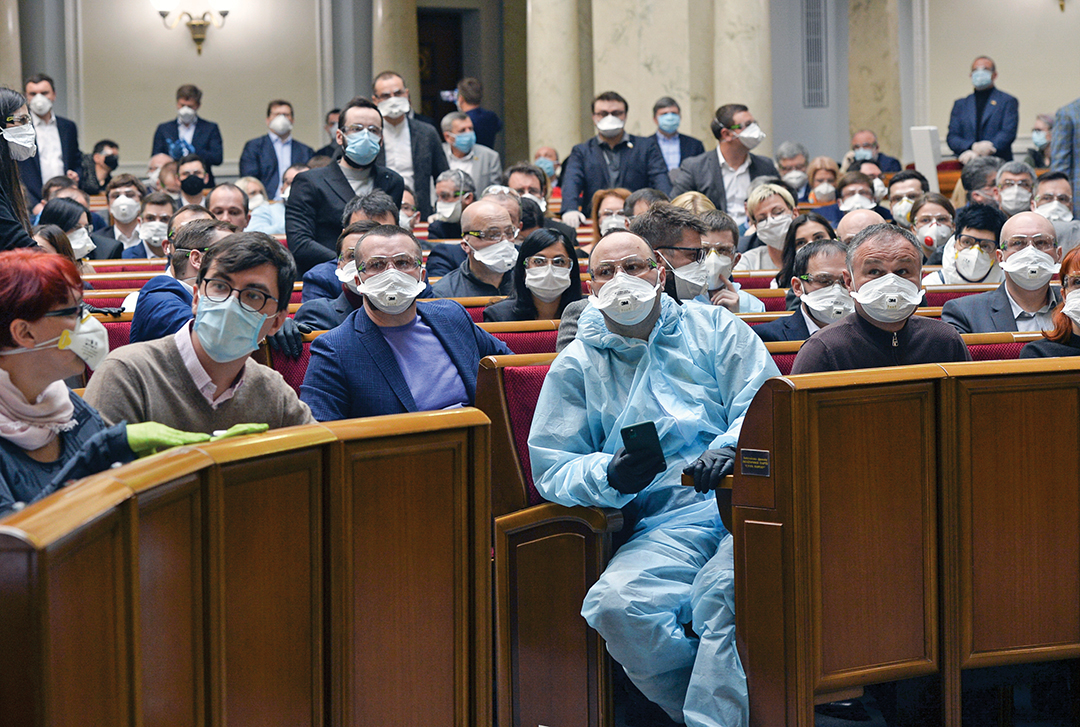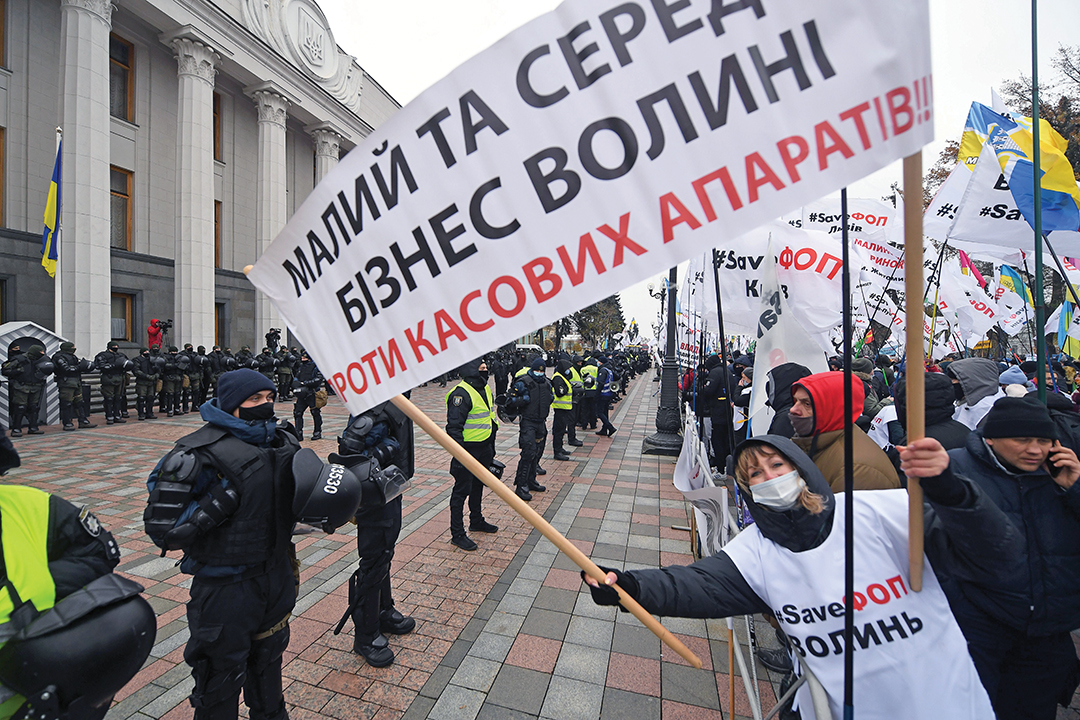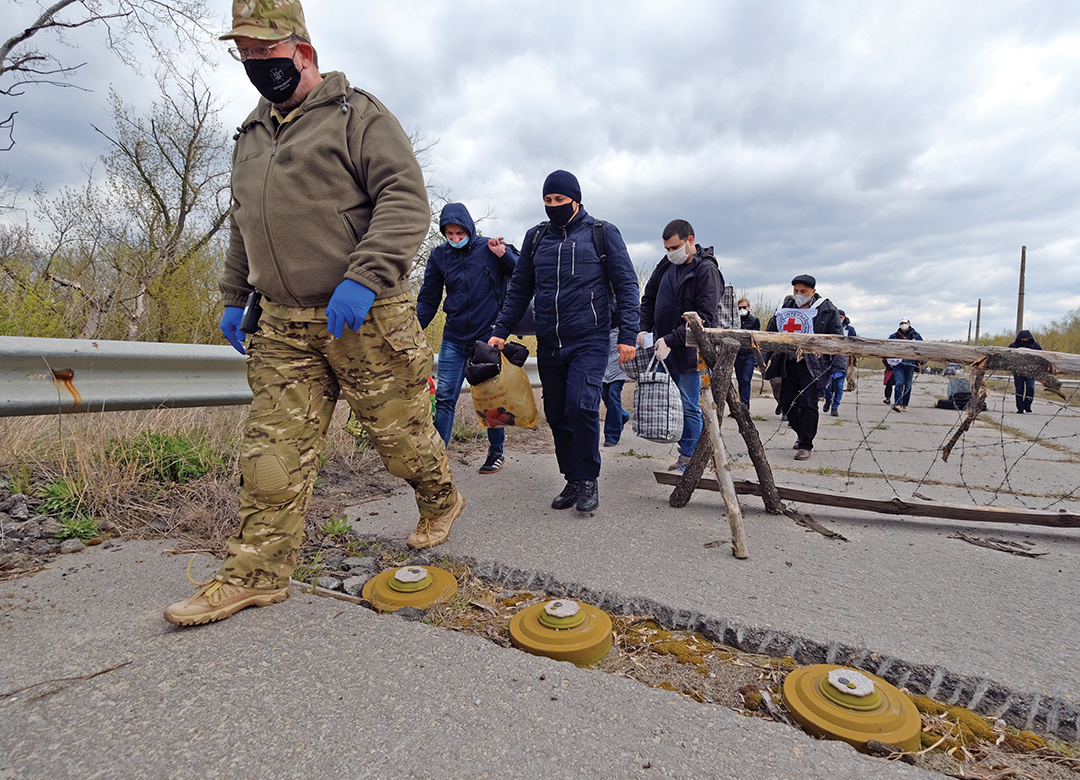The Pandemic and Its Impact on Ukraine
By Cmdr. John “Eric” Ager, U.S. Navy, Marshall Center professor
he COVID-19 pandemic shuttered most of the world’s economies and upended the regular conduct of government, diplomacy and international cooperation. While the impact of the crisis has been significant worldwide, it struck during a particularly difficult period for Ukraine, which faces a tough fight to reassert its sovereignty over the Donbas region and Crimea, while trying to reform its government and reduce corruption. Following the 2014 protests across Ukraine known as the Euromaidan revolution, which led to the departure of then-President Viktor Yanukovych, Russia’s illegal annexation of Crimea and a Russian-backed insurrection in the Donbas, Ukraine embarked on an ambitious effort to shift the orientation of its foreign policy and to reform its government, especially the defense establishment, in line with Euro-Atlantic principles.
Background
With the election of Petro Poroshenko as Ukraine’s president in May 2015, and the subsequent victory of pro-Western parties that fall, the government made a concerted shift toward European integration and began an ambitious reform agenda despite the continuing armed conflict in the Donbas. Though there were notable reforms in the years that followed, including passage of the Law on National Security, the Poroshenko government was hampered by the continuing conflict with Russian-backed separatists and a number of high-profile corruption scandals.
The waning ability of the Poroshenko administration to implement the changes demanded by the electorate led to a resounding victory for Volodymyr Zelenskiy, a new arrival to Ukrainian politics, in the 2019 presidential election and, initially, renewed energy in the government and society for reform. The Zelenskiy administration began with a lot of hope and significant political capital stemming from an electoral victory with more than 70% of the vote. The new president started off auspiciously by appointing a number of prominent reform figures to serve in the government, including Oleksiy Honcharuk as prime minister, Andriy Zagorodniuk as minister of defense, and Oleksandr Danylyuk as secretary of the National Security and Defense Council. Zelenskiy and his government, with a supermajority of his Servant of the People party in the Verkhovna Rada (parliament), took steps to directly confront the nation’s challenges. They engaged in concerted diplomatic efforts to begin resolving the conflict in the Donbas; continued reforms in the judiciary and in the defense and security establishment; and confronted significant third-rail roadblocks to economic progress, such as land reform.
However, the new government’s political honeymoon was short-lived. It quickly ran into difficult obstacles, including efforts by the country’s oligarchs to reassert their influence, a lack of progress toward ending the conflict in the East, and an inability to rapidly modernize the economy. In March 2020, Zelenskiy moved to shake up the government, removing Honcharuk and a number of other government ministers, just as the pandemic was beginning to impact the world.

COVID-19’s emergence
As the initial COVID-19 cases surfaced in Ukraine, new Prime Minister Denys Shmyhal and several other new ministers were just coming into office and struggling to gain political traction. According to the World Health Organization, the first death attributed to COVID-19 in Ukraine occurred on March 14, 2020, just 10 days after Shmyhal became prime minister. As the new government was seeking its footing in a difficult political environment and facing strong criticism from voices in the reformist community, they were forced to refocus their priorities on dealing with the threat of COVID-19. The response consumed the government. As time progressed, while Ukraine’s experience with the virus was not notably worse than others in the region, it struggled to execute a common-sense public health strategy while preventing economic collapse.
The government executed a straightforward, standard strategy to deal with the virus in the early part of 2020, though the initial response caused some political turmoil. In February, when the Ukrainian government evacuated 45 citizens and 27 foreign nationals from Wuhan, China, and quarantined them in the town of Novi Sanzhary, it caused serious political unrest in the local population, which feared that the returnees were infected. As the crisis heightened, the new government implemented a three-week national quarantine on March 12, and Zelenskiy ordered the borders closed on March 13. The quarantine was eventually extended through May 11, 2020, when the restrictions began to be eased, but the decisions to close the subways and public transportation to most citizens, as well as the closing of businesses, were politically unpopular. The health minister, who had been appointed along with the new government in early March, was replaced before the month was over. Though the government allocated $221 million to pay unemployment benefits in April 2020, it was unable to prevent growing unrest in the business community. Like most countries, Ukraine was able to execute a limited easing of restrictions in May 2020, and air service began to return in June 2020, allowing embassy personnel who had evacuated to return. Of particular concern during the initial stages of the pandemic was how to limit the spread of the disease from the eastern parts of the country not under government control. To prevent spread in the Donbas region, the government closed the de facto border, preventing many in the conflict zone from reaching medical care and other necessary services.
Though the pandemic receded during the summer, cases began to rise in the winter, and the government, concerned about widespread travel for the holiday period, implemented another hard quarantine January 8-24, 2021. Significant overcrowding of the hospitals was prevented, but enforcement of the restrictions was uneven and Zelenskiy was criticized for taking selfies without a mask while visiting a ski resort in January. It remains to be seen whether the restrictions were enough to limit the impact of the virus until wide-scale vaccinations can return life to normal. As the pandemic and its effects continue around the world, it is clear that it is having an ongoing impact on Ukraine’s delicate diplomatic position in international politics and on the progress of governmental reform, especially in the areas of justice and defense.

International effects
Ukraine’s international relationships play a critical role in the government’s ability to defend the nation and develop it in a way that will lead to stability. Ukraine relies on support from the international community to maintain its economy and preserve its sovereignty. Its diplomats’ ability to navigate shifting global power balances has an inordinate impact on Ukraine’s economic and physical security, and the pandemic has exacerbated long-standing international challenges and created new dynamics. For instance, China is Ukraine’s largest trading partner and Chinese investment is a key component of its economy. Balancing the need for investment from China with the need for security assistance from the U.S. and NATO — as global competition between these two parties intensifies — will not be easy.
Since vaccinations began in 2021, the Ukrainian government has had to manage competing international vaccine efforts. Russia’s promotion of the Sputnik V vaccine and domestic political pressure to begin distribution have placed pressure on Ukraine’s diplomats to satisfy citizens’ demands without weakening its diplomatic position. The Western vaccines that have been rigorously tested and proven safe and effective are difficult to procure on the market. Pressure to pursue other options will continue until the crisis recedes. For example, Viktor Medvedchuk, leader of the Verkhovna Rada’s pro-Russian opposition party, traveled to Russia and made a deal with the Russian Direct Investment Fund and the Sputnik V vaccine developer, Gamaleya Center, to manufacture the vaccine in Ukraine, a nontransparent Russian attempt to take advantage of the fact that the West had not yet provided vaccines to Ukraine. This forced Ukrainian Foreign Minister Dmytro Kuleba to come out strongly against the plan, claiming, “Russia doesn’t care about the health of Ukrainians; it cares about forcing its own propagandist cliches and ideology via the supplies of the vaccine.” The pandemic has created opportunities for Russian disinformation in a population ripe for political exploitation, and the government’s ability to pursue effective policies will inevitably be impacted.
A lost year
Much of the energy of the Euromaidan revolution grew out of a desire to reform Ukraine’s legacy governmental structures, which had progressed little beyond their Soviet origin. The challenges are numerous: a judicial system easily influenced by money and politics, a Defense Ministry and Armed Forces with inefficient command and control mechanisms, and a limited tradition of civilian and parliamentary oversight. Though the pandemic is not solely responsible for the waning of reform efforts in 2020, it shifted the government’s focus toward dealing with the health crisis and away from efforts to implement reform within the government.
The Zelenskiy government had emphasized reform of the judiciary and worked to strengthen the Special Anti-Corruption Court since taking office, but as the pandemic struck, these efforts were already beginning to crumble under political pressure. The decision in March 2020 to replace well-respected Prosecutor General Ruslan Ryaboshapka with the controversial Iryna Venediktova, a political supporter of the president and member of his Servant of the People party, raised questions about the government’s commitment to anti-corruption measures and judicial reform. A lack of consensus and the influence of oligarchs in the Verkhovna Rada, along with the pressure of the pandemic, made further legislative changes difficult and efforts to reform the judiciary were pushed back. The Constitutional Court’s decision in the fall of 2020 to declare unconstitutional many of the activities of anti-corruption bodies put International Monetary Fund loans to Ukraine at risk and created a full-blown constitutional crisis as Zelenskiy fought to limit the court’s authority. Overall, 2020 was not a productive year for transforming Ukraine’s judiciary, an indirect result of the political turmoil created by the raging health crisis and its economic impact.
The ineffectiveness of Ukraine’s Armed Forces was immediately apparent in 2014 as they struggled to respond to Russian-backed aggression in Crimea and the Donbas. Despite resistance from some military leadership, who pointed to the immediate necessity of fighting a war, then-Defense Minister Stepan Poltorak pushed for slow, steady reform and had some notable successes, including passage of the new Law on National Security and implementation of a process to transform the command and control system in line with NATO principles. Following Zelenskiy’s election and the appointment as defense minister in August 2019 of the reform-minded Zagorodniuk, the Ministry of Defense introduced ambitious plans to push forward with reform of the command and control system, revamp the procurement process and reorganize the ministry. However, Zagorodniuk was replaced by retired Lt. Gen. Andrii Taran as part of the government shakeup just as the COVID-19 crisis hit Ukraine. Taran faced the immediate need to ensure the health of the force while supporting the government’s COVID-19 response. These immediate challenges drove the ministry’s agenda and slowed efforts to transform the decision-making processes within the defense establishment. The leadership shakeup at the Ministry of Defense and the challenges of dealing with the pandemic within the Armed Forces — and the country — inevitably slowed progress on reform.
Reforms in Ukraine may have stagnated in 2020 even without COVID-19, but the pandemic caused the dispersal of many international advisors who had been in Kyiv assisting and advising Ukrainian institutions on democratic reforms and holding the government responsible for progress. Additionally, the pandemic allowed ministers and senior officials to shirk the hard work of transforming their institutions because the crisis consumed scarce resources and the human capital essential to pushing ahead with reform. In the end, 2020 was a lost year in Ukraine’s uneven march toward more effective governance and corruption prevention.

Conclusion
The full impact of the pandemic on Ukraine is not perfectly clear from our current historical perspective, but it is likely that the indirect effects will last longer than the direct effects. The primary indirect effects have been the distraction of Ukraine’s foreign partners, an increased sense of crisis within the government, and the government’s loss of focus on reform. These challenges have clearly prevented Ukraine from making the progress in diplomacy and reform that might otherwise have been expected. The loss of momentum could have long-term effects on Ukraine’s ability to turn the corner toward full Euro-Atlantic integration as enshrined in the policies of both post-Euromaidan governments.
Ukraine will face a difficult path in a world economy that is likely to emerge slowly from the pandemic, and in a region where the security situation remains unsettled. Though the political pressure to focus on near-term challenges is not likely to fade, the long-term success of the nation will require the government to refocus on its relationships with supporting partners in the trans-Atlantic community, on developing governmental mechanisms that are able to implement policies that improve people’s lives, and on continuing to push for reform despite the inevitable setbacks that will occur. The pandemic has made the task more difficult, but the vision of a Ukraine that is whole and free within a stable Europe, a vision that has animated political life in Ukraine since the Euromaidan, will allow the government to meet the long-term expectations of Ukrainians. Progress is unlikely to proceed in a straight line, but the fits and starts of democracy in action will lead to steady improvement, despite the pandemic’s emergence at the top of Ukraine’s long list of challenges.


Comments are closed.